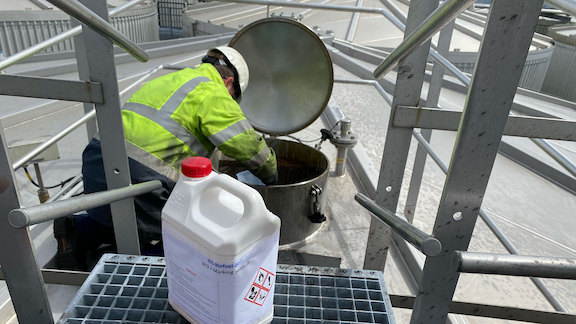GoodFuels, the leading biofuels provider for the global transport industry and frontrunner in supply chain sustainability assurance, has today announced the results of a new partnership with global certification organisation Control Union and France’s IDS Group to test the effectiveness of a unique isotopic tracer for biofuels.
A successful pilot, conducted during a recent delivery of 500 tonnes of biofuel to the NORDEN-owned tanker Nord Gardenia, has proven the effectiveness of the tracer technology in real-life applications.
The partnership, which commenced in early 2022, has seen the companies collaborate to create the new tracer, which can be added to marine fuels as a unique ‘fingerprint’ and verification tool.
The isotopic tracer stays within the fuel throughout the entire downstream of fuel delivery. It then can be tracked and traced by inspectors to verify that a fuel product has not been diluted or tampered at any stage in the supply chain. The trial has demonstrated that the tracer does not adversely impact the physical properties, quality and stability of the biofuel, and that tracing and testing activities could be performed without any impact on bunker operations.
The pilot also showed that the isotopic tracer can successfully measure for fuel dilution, when biofuels are used in a blend, for example.

The tracer can be applied at any stage in the supply chain and is based on natural elements so as not to compromise the sustainability of the biofuel product. It has been specifically designed to trace fuels at different granularity levels, making it suitable to be used within fuel products whether they are 100% biofuel or part of a blend with conventional marine fuels.
It can also be used to support carbon calculations and provide evidence for carbon pricing and tax reductions, giving shipowners and operators assurance on the amount and quality of biofuel they are deploying in their pursuit of sustainable shipping.
Commenting on the partnership, Dirk Kronemeijer, CEO of GoodFuels, said: “Being able to undisputedly trace that our fuels are sustainable and uniquely assignable to one of our clients is intrinsic to what we do at GoodFuels. Following the world’s first bunker delivery using blockchain technology in 2018, we continue to introduce cutting-edge solutions, together with our partners, to increase traceability in the shipping industry. Using a physical marker that combines with software is the likely next step in this trend. We are focused on driving even greater trust and transparency in the marine fuels supply chain – two values that are inherent to GoodFuels and GoodShipping.”
Johan Maris, CEO of the Royal Peterson and Control Union Group emphasised the importance of the successful trial: “Through this trial we have now proven this tracer technology, and that proof brings endless potential. The tracer technology can, for example, ensure that fuel doesn’t originate from banned countries but can also be used for many other purposes, in other liquids like oil or even champagne, and in almost any type of solid materials like meat, plants, and metal.”
Patrice Fauvet, CEO and R&D Director of IDS Group, said: “We are pleased to demonstrate and prove our ability to physically mark, track and trace (bio)fuel products, setting the new bar for traceability alongside the frontrunners in sustainability. We are also exploring expanding our patented marking technologies to any other hydrocarbons product.”
Henrik Røjel, Head of Fuel Efficiency & Decarbonisation at NORDEN, said: “Biofuel is a key transition fuel on NORDEN’s journey to zero-carbon shipping, as it can be used onboard our current vessels to make an immediate reduction on carbon emissions. We continue to bunker biofuel on a regular basis and support efforts of adding more transparency on the green fuels we bunker.”
The tracer project is just the start of a wider partnership between GoodFuels, Control Union and IDS Group. All three companies share an ambition to increase transparency in the fuel supply chain, and the tracer will help to advance a shared vision of a standard label for biofuels that would be recognised worldwide as a sign of quality by the fuel market.

Follow us on social media: